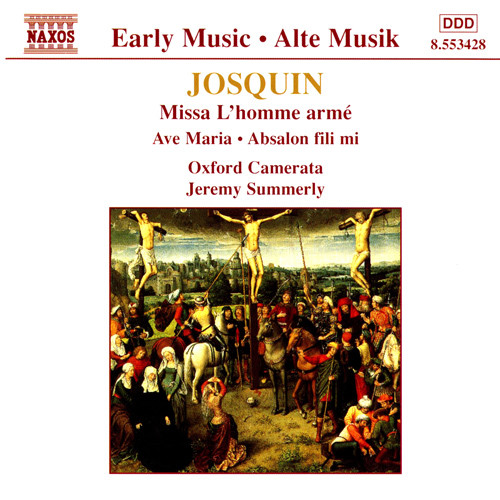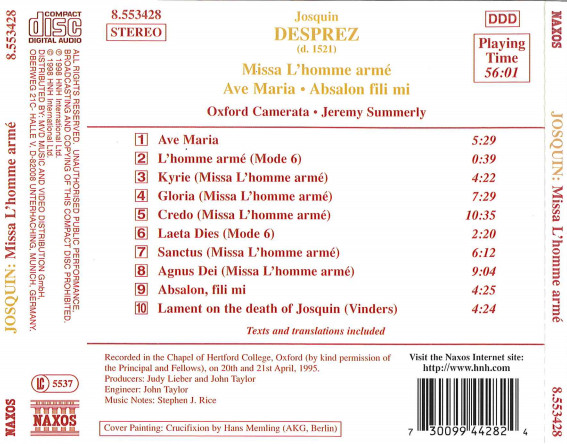
classical music distribution


(Produkt nie został jeszcze oceniony)
kompozytor
Desprez, Josquin
tytuł
Josquin: Missa L'homme Arme
wykonawcy
Oxford Camerata;
Summerly, Jeremy
Summerly, Jeremy
nr katalogowy
8.553428
opis
Where and what Desprez wrote is an argument that still provide scholars with much to deliberate. Why is there just one work, the Ave Maria which opens this disc, written before 1485 when his known output began? If the reasonable guess of his birth date as being 1440, that would place the Ave Maria in his thirty-sixth year. Though a work of some stature, it is hardly a masterpiece from a highly acclaimed composer. Was he born much later and that Josquin in Milan is, after all, another person? The Missa L'homme armé probably dates from the late 1490's and forms part of a number of Masses he composed around that time. It is in five sections, into which the conductor has introduced the Laeta Dies. The Credo is a well worked section of considerable length for that period, but the remaining parts of the Mass are of an uneventful nature, which is making modern musicologists reexamine Josquin's apparently high ranking in the musical world in the early part of the 16th century.
The booklet accompanying the disc details modern thoughts as to the origin of Absalon fili mi. Whatever its inception, it is a particularly beautiful and serene lament, that would fit a date from the end of the 16th century.
The disc ends with the Lament on the death of Josquin by Jheronimus Vinders, a composer born in Flanders of whom nothing is known. Whether he even knew Josquin we do not know, but the composition is one of deep compassion.
The booklet accompanying the disc details modern thoughts as to the origin of Absalon fili mi. Whatever its inception, it is a particularly beautiful and serene lament, that would fit a date from the end of the 16th century.
The disc ends with the Lament on the death of Josquin by Jheronimus Vinders, a composer born in Flanders of whom nothing is known. Whether he even knew Josquin we do not know, but the composition is one of deep compassion.
nośnik
CD
gatunek
Muzyka klasyczna
producent
Naxos
data wydania
23-03-1998
EAN / kod kreskowy
730099442824

(Produkt nie został jeszcze oceniony)
cena 58,00 zł
lubProdukt dostepny w niewielkiej ilości.
Wysyłka w ciągu 3 dni roboczych
Darmowa wysyłka dla zamówień powyżej 300 zł!
Darmowy kurier dla zamówień powyżej 500 zł!
sprawdź koszty wysyłkiProduktu jeszcze nie zrecenzowano, chcesz być pierwszy?
Klienci, którzy kupili ten produkt, kupili również
Guillemain, Louis-Gabriel
Guillemain: Amusements - muzyka skrzypcowa na dworze Ludwika XV
MU-004
Malipiero, Gian Francesco
Malipiero: Symphony No. 6; Ritrovari; Serenata mattutina; Cinque studi
8.574173
Pozostałe płyty tego kompozytora
różni kompozytorzy
WYCOFANY Resonances - Châteaux de la Loire; French Renaissance Court music
HMX 2908550.51
Mantoue, Jachet de, Desprez, Josquin
Desprez: Motets, Stabat Mater & Salve Regina, Mantoue: Dum vastos Adriae fluctus
CAL 9407
różni kompozytorzy, Desprez, Josquin, Lasso, Orlando di
L'Europe Musicale de la Renaissance - muzyka XVI wieku od Josquina Desprez do Rolanda de Lassus
RIC 106
różni kompozytorzy
Jordi Savall; Erasmus van Rotterdam: Pochwała głupoty - czytane fragmenty dzieła + muzyka z czasów Erazma
AVSA 9895
Pozostałe płyty tego wykonawcy
Hildegard von Bingen
Hildegard von Bingen: Heavenly Revelations ,Sequences, Antiphons, Responds
8.550998
Palestrina, Giovanni Pierluigi da, Allegri, Gregorio
PALESTRINA: Missa Papae Marcelli / ALLEGRI: Miserere
8.553238
różni kompozytorzy
English English Madrigals and Songs from Henry VIII to the 20th Century
8.553088
Napisz recenzję dla: Josquin: Missa L'homme Arme
Zapytaj o dostępność produktu
Twoje zapytanie:
Odpowiemy na adres:
Produkt został dodany do koszyka

Desprez, Josquin
Josquin: Missa L'homme Arme
1 szt











































